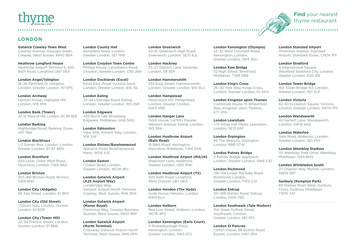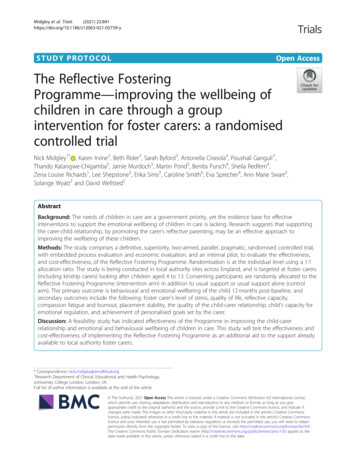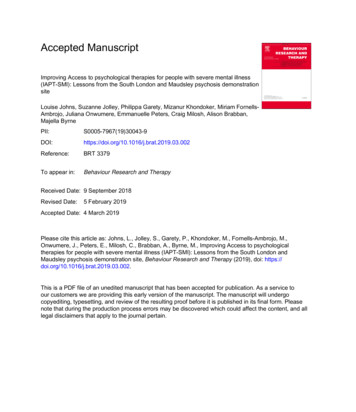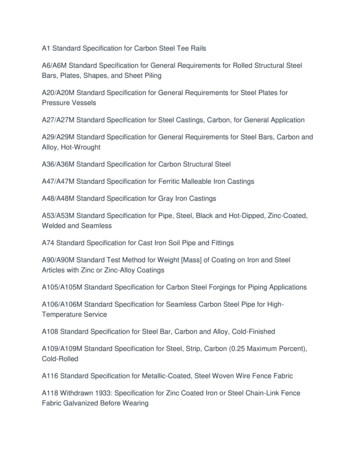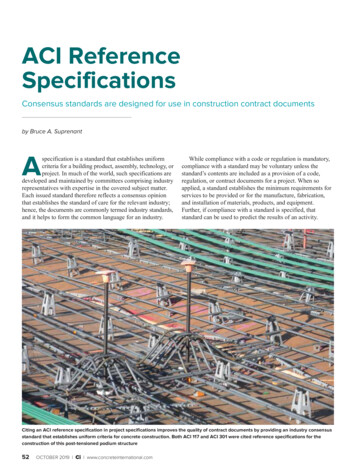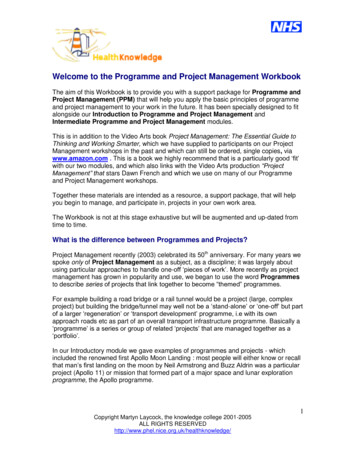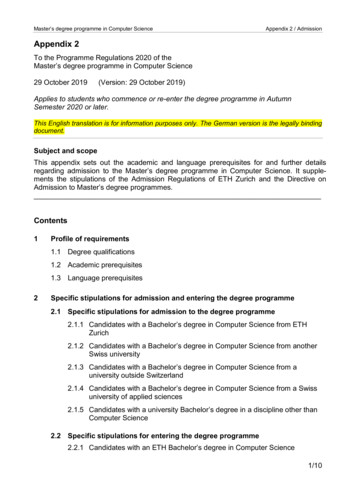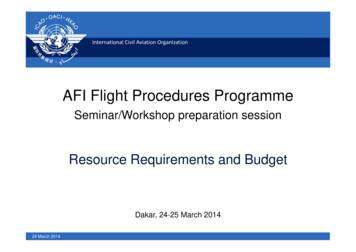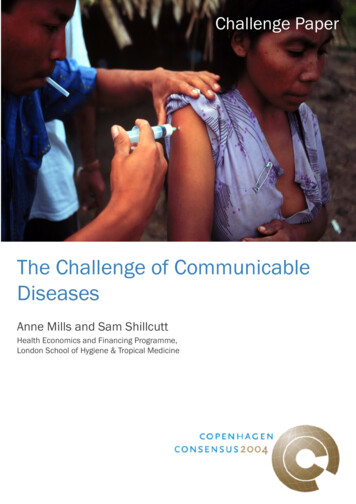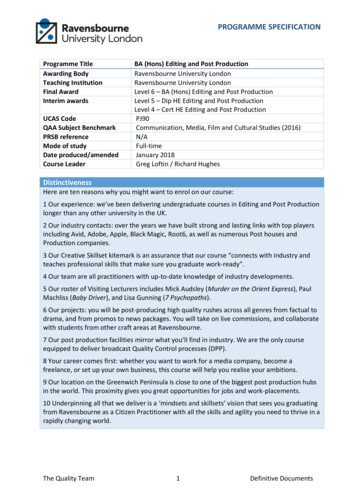
Transcription
PROGRAMME SPECIFICATIONProgramme TitleAwarding BodyTeaching InstitutionFinal AwardInterim awardsUCAS CodeQAA Subject BenchmarkPRSB referenceMode of studyDate produced/amendedCourse LeaderBA (Hons) Editing and Post ProductionRavensbourne University LondonRavensbourne University LondonLevel 6 – BA (Hons) Editing and Post ProductionLevel 5 – Dip HE Editing and Post ProductionLevel 4 – Cert HE Editing and Post ProductionPJ90Communication, Media, Film and Cultural Studies (2016)N/AFull-timeJanuary 2018Greg Loftin / Richard HughesDistinctivenessHere are ten reasons why you might want to enrol on our course:1 Our experience: we’ve been delivering undergraduate courses in Editing and Post Productionlonger than any other university in the UK.2 Our industry contacts: over the years we have built strong and lasting links with top playersincluding Avid, Adobe, Apple, Black Magic, Root6, as well as numerous Post houses andProduction companies.3 Our Creative Skillset kitemark is an assurance that our course “connects with industry andteaches professional skills that make sure you graduate work-ready”.4 Our team are all practitioners with up-to-date knowledge of industry developments.5 Our roster of Visiting Lecturers includes Mick Audsley (Murder on the Orient Express), PaulMachliss (Baby Driver), and Lisa Gunning (7 Psychopaths).6 Our projects: you will be post-producing high quality rushes across all genres from factual todrama, and from promos to news packages. You will take on live commissions, and collaboratewith students from other craft areas at Ravensbourne.7 Our post production facilities mirror what you’ll find in industry. We are the only courseequipped to deliver broadcast Quality Control processes (DPP).8 Your career comes first: whether you want to work for a media company, become afreelance, or set up your own business, this course will help you realise your ambitions.9 Our location on the Greenwich Peninsula is close to one of the biggest post production hubsin the world. This proximity gives you great opportunities for jobs and work-placements.10 Underpinning all that we deliver is a ‘mindsets and skillsets’ vision that sees you graduatingfrom Ravensbourne as a Citizen Practitioner with all the skills and agility you need to thrive in arapidly changing world.The Quality Team1Definitive Documents
PROGRAMME SPECIFICATIONThe Mindsets and Skillsets Manifesto: Five PrinciplesRavensbourne developed its Mindsets and Skillsets Manifesto as part of an institution-widePortfolio Review. This was the culmination of a significant process that included a broadliterature review; various outputs from national and international conferences andinstitutional visits; a ‘Futures in the Making Symposium’ attended by academic faculty featuring an industry panel and a second panel of high profile external academics; a ‘20 / 20 /20 Visiting Lecture Programme’; and market analysis of existing courses and the university’sacademic framework. The final Manifesto also drew from the institution’s Strategic Plan andthe Director’s post-2018 vision document.The Mindsets and Skillsets Manifesto consists of Five Principles that creates the basis of avision that informs a new academic framework, its new curriculum, and all course levellearning outcomes. This Manifesto underpins the validation and revalidation documentspresented here, and is briefly articulated in the following way:1. Cultivate / where the individual thrives Holistic Education: beyond the discipline Life Skills: resilience, self-efficacy, multiple intelligenceExtending the norms of skills-acquisition and competency-based approaches Cultivatenurtures the creative individual beyond the academy, embracing the holistic notion ofeducating the whole person.Critical life-skills are investigated and multiple intelligences explored through a model thatsupports professional and personal development to create and support resilient and inclusiveindividuals prepared for work in the ever-changing creative industries and for living withwider societal and cultural flux in the 21st century.2. Collaborate / where disciplines evolve Blurring Disciplines: petri dish for new thinking and practice Shape-Shifters: new practice demands new practitionersThe Collaborate model enables students with discipline-specific knowledge to apply their owncreative thinking, design and media practices and methodologies and production techniquesto interdisciplinary and transdisciplinary projects.Interdisciplinary project models integrate subject knowledge and working methods from arange of disciplines to create synthesis of practice, whilst the transdisciplinary model createsnew and extended disciplinary modes through the unity of intellectual and practice-basedframeworks to reach beyond single disciplinary perspectives.3. Integrate / where education engages industry Professional Modes: education mirrors industry Depth and Breadth: specialists and generalistsA model that integrates academic delivery with industry practice; enabling subject-specific,interdisciplinary student teams to replicate modes of working found within relevant2The Quality TeamDefinitive Documents
PROGRAMME SPECIFICATIONprofessional models; the Production House in Film and TV, the Design Studio incommunication and media design, the Fashion House in fashion and textiles, the AdvertisingAgency in advertising and promotion and the Architecture Practice in architecture andinteriors.Typically the Integrated Team, with each member assigned a specific role, works to a phaseddelivery that may include the Discover, Define, Develop and Deliver stages of the DesignDouble Diamond. Integrate challenges traditional constraints in the teaching of the solopractitioner and embraces the notion of disciplinary discovery and practice through teamworking.4. Advocate / where purpose meets practice Citizen Practitioners: tackling real-world problems Self to Selves: from the individual to the collectivePutting purpose first, Advocate recognises the responsibility for creative education to addressthe unprecedented environmental, social and economic challenges facing humankind;tomorrow's designers and media practitioners are increasingly aware of their responsibilitiesas global citizens to engage with complex ethical issues related to climate change, socialjustice, interdependence, wellbeing and biodiversity.Advocate puts studio projects and commercial and charitable industry commissions at thecentre of the educational experience enabling students real-world opportunities to improvethe communities in which they live and work and in turn begin to transform the wider world.5. Originate / where creativity meets technology Mind-Sets Skill-Sets: the dynamism of ideas technology Applied Mastery: leveraging theory, practice and innovationSitting at the intersection of creativity and technology, Originate enables the merging ofvisionary mind-sets and skill-sets to provide provocative and challenging design and mediaapproaches. The amalgamation of theory and practice, Originate embraces both integratedand agile design-thinking and design-doing practice and research methodologies to forgedynamic technologically-savvy and creativity-driven responses and solutions to given and selfdirected industry-leading projects.Programme aims Develop a range of creative, technical, vocational, practical, and critical skills andcompetencies that will inform your knowledge of the principles, contexts, and creativepractices of post production sectors. Demonstrate a coherent and detailed knowledge and practical application of editorialstorytelling, and the specificities of the related crafts of visual effects, grading, sound design,and shoot-and-edit. Demonstrate knowledge and operational expertise in post production technology in a varietyof technical environments.3The Quality TeamDefinitive Documents
PROGRAMME SPECIFICATION Encourage independent and critical thinking and develop transferable skills andcompetencies in preparation for work. Develops experience and knowledge of individual,collaborative, and multidisciplinary working. Be adaptive, inventive, and questing in a rapidlychanging and connected world. Be able to demonstrate professional skills, responsibility and disciplined decision makingabilities, communication, research and problem solving skills, and other such transferable, lifelong learning skills necessary for employment.Programme Learning OutcomesThe course provides opportunities for students to develop and demonstrate knowledge andunderstanding, qualities, skills and other attributes in the following areas.LO 1 Research/InspirationSelect and evaluate information gathering techniques using a wide range of sources, providingvisual, contextual and industry case-study research as appropriate.Related Principle: ORIGINATELO 2 Concept/IdeationCritically appraise and evaluate appropriate research materials to generate workable conceptsor strategic project themes that inform and underpin project development.Related Principle: ORIGINATELO 3 Development/PrototypingInvestigate potential pathways that result in appropriate solutions, informed by a systematicunderstanding of the principles of the creative process.Related Principle: INTEGRATELO 4 (Pre) ProductionDemonstrate systematic working knowledge, production skills, selection, application andunderstanding of a selection of processes, materials and methods that inform creative andacademic practice.Related Principle: COLLABORATELO 5 Presentation/Storytelling For InfluenceCommunicate projects creatively and professionally, whether in visual, oral or written form.Methods of presentation are appropriate to the audience/client and the purpose of the work.Related Principle: ADVOCATELO 6 Critical and creative mindsetsEvaluate a range of critical approaches in order to form an independent position.Related Principle: ORIGINATELO 7 EmployabilityEffectively employ professional transferrable and employability skills, including the ability to4The Quality TeamDefinitive Documents
PROGRAMME SPECIFICATIONmanage time and work to clear briefs and deadlines, respond to set goals, and communicateeffectively.Related Principle: CULTIVATELO 8 Professional IdentityAlign your professional identity as a practitioner with a viable career context.Related Principle: CULTIVATELearning and Teaching methodsAssessment StrategyStudents learn through a variety of methodsincluding project briefings, lectures, (staff andstudent led) group seminars, technical orpractical workshops, demonstrations, onlinecontent, and discussion critiques, individual orgroup tutorials, and self-directed study.Your units will be assessed at twostages: work-in-progress (Formative) andfinal delivery (Summative).You will provide evidence of the work andlearning carried out for each unit. This mayinclude edited videos, essays, backgroundresearch, development materials and/orevidence of reflection on the process ofdevelopment.The teaching and learning methods employedinduct you into the disciplines required of aCitizen Practitioner and promote thedevelopment of transferable skills.The study time allocated to each unit contains abalance of formal teaching, tutorials supportand independent learning.The course is structured to provide increasedopportunities for independent learning as youreach the later stages of the course.You are also assessed through peer-to-peer,group and self-assessment. An individual orgroup presentation may also form part ofthe assessment requirements of someprojects.Level 4EMPOWER (establish core skills)You’ll learn about the history and diverselandscapes of the post production sector, theplatforms, roles, business models and theaudiences. You will develop skills in theeffective use of post production tools, the‘grammar’ of editing and post technology. Thisis buttressed by a critical analysis or your craftwithin wider social, cultural and aestheticformations. You will work on a range of genresincluding documentary, drama and promos.Level 5EXPLORE (acquire specialist skills and a questing5The Quality TeamDefinitive Documents
PROGRAMME SPECIFICATIONsensibility)In your first elective unit this year, youwill develop advanced skills in another craftarea: VFX, Colour Grading, or Shoot-and-edit.The second elective encourages you to workcollaboratively with students from otherdisciplines in the design and delivery of a socialproduct. In the spring term you will explore thePost House sector, develop your professionalskills, and find a work placement. The Big Ideasand Philosophies unit will engage you withimportant issues and debates, and help youlocate your profession in the bigger picture.Level 6ENGAGE (professionalise/personalise).The focus here is on independent learning,professional and reflective practice in readinessfor your career in post production.Portfolio is a self-directed unit which allows youto engage with clients and students from otherdisciplines to develop a body of post productioncommissions that demonstrates your advancedcraft and technical skills across a range of mediaproducts.Cutting Edge examines new and emergingtechnologies, platforms, tools and formats. Youwill conduct primary research and produce aDissertation that demonstrates your ability tothink, process, and deliver a coherentargument.6The Quality TeamDefinitive Documents
PROGRAMME SPECIFICATIONUnit CodeLevel 4C18101EPP18102EPP18103EPP18104EPP18105Level 04CIE18200EPP18205Level 6C18301EPP18301EPP18302EPP18303EPP18304Unit TitleCreditsTHEMES IN CONTEMPORARY CULTUREFIRST POSTPOST INDUSTRYCRAFT EDITINGPOST TECHNOLOGY1530153030BIG IDEAS AND PHILOSOPHIESCross – Department Electives1515STORY 1DIGITAL INTERMEDIATEPREP FOR INDUSTRYCROSS-INSTITUTION ELECTIVESTORY 21515151530DISSERTATION UNITPROFESSIONAL SKILLSCUTTING EDGEPORTFOLIOWORKFLOW3015154515360Entry RequirementsStudents will normally be expected to possess five GCSEs (grade C or above) or equivalent(including English) and also to hold at least one of the following or equivalent UK orinternational qualification:·2 A Levels (grades A-C) or 4 AS Levels (grades A-C)·2 vocational A Level (grades A-C)·Level 3 Foundation Diploma or National Diploma·Advanced Diploma (grades A-C)·International Baccalaureate (28 points or above)Where an applicant’s first language is not English, proof of competence in English will berequired. For undergraduate and postgraduate programmes, this will normally take the formof an approved English language test at B2 level in the Common European Framework ofReference. Any test for proficiency in English must have been achieved within 18 monthspreceding the date of entry. Individual programmes may have higher language requirements.Ravensbourne’s international department will advise applicants on the language requirementsfor particular programmes.7The Quality TeamDefinitive Documents
PROGRAMME SPECIFICATIONSelection CriteriaRavensbourne will use a number of methods to assess an applicant’s suitability for their courseof choice. Primarily applicants are selected on the basis of: an applicant’s prior academic achievement/qualifications and/or previousemployment/life experience;assessment of the applicant’s ability and aptitude to succeed on the course for whichs/he has applied.Students will be selected according to the generic criteria set out below:Personal attributes shows commitment, enthusiasm and interest in the subject areainitiative and problem solvingability to communicateCreative process can generate ideas and use external sources to develop themability to research an idea and follow it through to a finished productStudy skills can understand and organise information clearlycan investigate and analyse informationshows reasoning and intellectual curiosityProfessional skills has shown they can initiate and deliver projectscan work in a team and with people with different skillshas shown confidence with ITCareer aspirations understands the relevance of the course to her/his career ambitionsunderstands current debates within industryAccreditation of Prior LearningApplications are welcome from those who may not possess formal entry qualifications, maturestudents, those with work experience or with qualifications other than those listedabove. Such applicants should demonstrate sufficient aptitude and potential to complete thecourse successfully. Applicants will be assessed at interview in accordance withRavensbourne’s Accreditation of Prior Learning Policy and Procedure.Student c.uk/display/SS/Student sment - UG and PG8The Quality TeamDefinitive Documents
PROGRAMME SPECIFICATIONLevel 4XXXXXXXXXXXXXXXXXXXXXXXXXXXXXLO6XWorkflowXCutting EdgeXPortfolioLO5Professional skillsXXXStory 2XLO4DIPrep for IndustryElective 2Elective 1Story 1XLO3LO8Level 6XLO2LO7Post TechnologyCraft EditLO1Post IndustryFirst PostCourseLOsLevel 5XXX9The Quality TeamDefinitive Documents
PROGRAMME SPECIFICATIONThe Course descriptionThere are three key events in the life of a film: the script, the shoot, and the edit. Editing iswhere it all comes together, where meaning is created through cutting sound and picture.This is the moment when the story is finally told.While editing is at the heart of this course, you’ll also specialise in at least one other craft:visual effects, colour grading, or shoot-and-editThese are crafts of extraordinary power and nuance. Through them you can inform andenlighten, and you can change people’s minds. You can arouse great emotion, and you cancreate immersive fantasy worlds.You will develop these skills through workshops, through making, and through giving andtaking feedback. At the same time, you will acquire skills in post technology and mediamanagement which form the backbone of your craft. And throughout your learning journeyyou will come to see your practice within the context of wider social, cultural and aestheticformations.You will engage in debates around the vital issues of our age, and develop advocacy skillsthat expand the definition of ‘professional’ towards the idea of ‘Citizen Practitioner’.Your job prospects are excellent. At one time post production was a fairly small industryserving only the film and TV industry. Today the map has been completely redrawn: editingis now practiced virtually everywhere across the commercial, public, and charity sectors.Telling stories in moving pictures and sounds has become our preferred way to talk to ouraudiences and customers.As a result, we’ve seen enormous growth is the post production job market; around 90% ofour students find employment within three months of graduating. Typically these will bejunior roles in editing, colour grading, compositing, and sound design, as well as a range ofhospitality and technical roles such as runner, edit producer, data wrangler andpostproduction technician.Some will blaze a trail in the rich and diverse worlds beyond the media sector, while otherswill make their mark in the postproduction heartlands: BBC, SKY, ITV, Disney, Vice, Envy,Halo, The Farm, Molinaire, Dneg, Framestore and The Mill. Our graduates have worked onmany prestigious films including Amy, Thor, Star Wars, and Fantastic Beasts and Where toFind Them.10The Quality TeamDefinitive Documents
PROGRAMME SPECIFICATIONAcademic Framework – Course diagramLevel 4120creditsTerm1Induction(Inc. contribution fromTheory) 0 creditsEPP18102 First PostTerm2Term 3C18101 – Themes in Contemporary Culture30 creditsEPP1803 Post Industry30 credits30 creditsCIE18200Cross – Institutional15 creditsC18201 – Part 2 Big Ideasand Philosophies(Dissertation Proposal)15 creditsEPP1804 Craft EditingEPP1805 Post Technology15 creditLevel 5C18201 – Part 1 Big Ideasand Philosophies(7.5 out of 15 credits)120credits(remaining 7.5 out of 15credits)Elective 1:EEPP181 GradingEEPP182 VFXEEPP183 Shoot-and-editEPP18203 DigitalIntermediariesEPP18205 Story 230 credits15 credits15 creditsEPP18202 Story 115 creditsLevel 6120creditsEPP18204 PREP FORINDUSTRY15 creditsC18301 Dissertation30 creditsEPP18301 ProfessionalSkillsEPP18303 Portfolio45 credits15 creditsEPP18302 Cutting EdgeEPP18304 Workflow15 Credits15 Credits11The Quality TeamDefinitive Documents
PROGRAMME SPECIFICATION The Quality Team 1 Definitive Documents Programme Title BA (Hons) Editing and Post Production Awarding Body Ravensbourne University London Teaching Institution Ravensbourne University London Final Award Level 6 - BA (Hons) Editing and Post Production Interim awards Level 5 - Dip HE Editing and Post Production Level 4 - Cert HE Editing and Post Production
